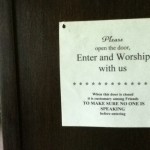 I’ve been reading Will Taber and Liz Opp talking about corporate vs. individual worship, and I’m seeing a few things a little more clearly as a result. I think I’m seeing (better) what I look like through other eyes, and I think I’m understanding (better) what the forces are that are “corrosive to community”—what the liberal problem is and how it relates to—but is not the same—as my problem.
I’ve been reading Will Taber and Liz Opp talking about corporate vs. individual worship, and I’m seeing a few things a little more clearly as a result. I think I’m seeing (better) what I look like through other eyes, and I think I’m understanding (better) what the forces are that are “corrosive to community”—what the liberal problem is and how it relates to—but is not the same—as my problem.
My friend J-, when she was setting up a discussion group for Christ-centered and Biblically-based Quakers at Mt. Toby, talked about how so many people show up on the doorstep of a Quaker meeting having been wounded by their Christian upbringing, but nobody ever comes here who’s been wounded by a Hindu upbringing. And she’s right when she points out how that makes it harder for Christ-centered Quakers to access their own spiritual heritage.
It’s also hard in our society (I mean society with a small s here, not the RSoF)… it’s also hard for the same reasons to do any meaningful work around men’s spirituality, and absolutely impossible to identify at all with “white people” in a positive way. There is no such thing as white pride, and anyone misfortunate enough to have “white” as their only cultural identity will never be able to shake themselves loose from the racist rhetoric of the neo-Nazis circling that particular bandwagon.
I could talk for pages about the dilemma of trying to teach diversity to a high school student a couple of years ago whose grandfather had actually been in the Klan. That was your basic oh fuck situation. But it’s off topic this morning.
We were talking about Christianity. And, say what you will about rich white guys or about poor white trash, Christianity is definitely not an unmixed evil.
How’s that for damnation with faint praise? Let’s try again.
Christianity shares the imperfections of all human endeavors, but Christian myth and the Christian spiritual tradition is a source of inspiration, meaning, and support for many people who are really striving to find G*d, to experience G*d’s presence, and to do G*d’s will.
So my job, first of all, when I’m worshipping alongside Christians, is to set aside my allergic reaction to the exclusivist, imperialist language in the Bible. Let it go. They didn’t know any better. They found a door and it made sense that they thought it was the only one, and conquest was just what empires did back then. We each paint pictures of G*d with images taken from our own lives.
Liz Opp asks,
Whose responsibility is it to “translate” what it is we say to one another—the listener, the speaker, or both?
One practice I draw on from time to time is that of shifting my ‘translation’ of what a Friend has said. When I catch myself in judgment—which I don’t always do—I shift my thinking and begin to question, ‘If I trust that this Friend is speaking from a place of Great Love and with a burden to speak, what might I understand this person to be saying…? What is the piece of Truth that here that I can see?’
Benigno Sanchez-Eppler, in a Bible Half-Hour at NEYM Sessions last summer, told an incredibly moving story about acting as an English/Spanish translator for a bilingual meeting. The role there is very different from the analogous role at, say, the U.N. In a meeting for worship, the interpreter’s job is not just to translate the words but rather to wait until the same Spirit that has inspired the original message comes to him and then deliver the message—the same message, but coming from Spirit rather than from the original speaker—in the other language. And one of the messages Benigno was called upon to translate in this fashion was along the lines of, It is unfortunate that so many Quakers are tolerant of homosexuality, because it seems that many gays and lesbians are otherwise good people who would be able to live Godly lives if only they were encouraged to put aside this vile sin. Benigno is a passionate supporter of gay rights, and would have experienced the words of this message as hateful, yet he was able to open himself to the Spirit, to find the place of love from which the words had come, and to deliver the message, translating not just the words but the deeper meanings about finding the good in people and helping each other to open ourselves to G*d.
Benigno’s example here is deeply challenging to me, and probably to most of us. “We are tolerant of everything, except intolerance,” says Susanne Kromberg at Quaker Musings. Benigno shows us that true tolerance is possible, but also just how deep a concept it really is.
So Liz Opp also talks about corporate practice vs. shared individual practice.
Sometimes among Friends, we fall unawares into a shared spiritual individualism: We each practice our own spiritual discipline on First Day during worship and appreciate how we can come to meeting and worship together, despite our differences of belief and even practice.
OK, first of all, there’s a tendency to conflate beliefs about G*d with the experience of G*d. We’ve all seen that painting of the 12-foot tall transparent Jesus standing in the middle of a gathered Quaker meeting. As art, it sucks, but people still display it because it’s probably the only visual representation that’s ever come close to conveying the feeling of a gathered meeting. I have my own metaphors, but they’re more tactile and if I were to try to paint a picture, I certainly couldn’t do any better. The question that nobody’s asking—not even me, until I read Will Taber’s post and then re-read Liz Opp’s—is whether two worshippers with different beliefs about G*d can still be experiencing the same G*d. If I don’t see the Light as Jesus, am I still in the presence of the Light?
OK, well, duh. Of course all experiences of the G*d are ultimately of the same Divine source. (OK, some would disagree, but most Quakers—even the ones that are the most Christ-centered and Biblically-based—are universalist enough to accept that in principle.) But Quakers seem to be almost unique in being universalist in their beliefs while still very particularist in their practice.
Southern Baptists (at one extreme) have a vibrant and rich spiritual life and a deep personal connection with a loving and involved God, but they can’t maintain that without denying the validity of other paths. To them, all other religions worship false gods, which are really just Satan in disguise.
Unitarian Universalists (at the other extreme) simply don’t worship. They have interesting academic lectures every Sunday morning, and when Quakers worry about our tradition getting watered down by our openness to diversity of belief, the UU’s are what we’re afraid of becoming.
Most Christians probably occupy some sort of middle ground, believing that we are saved because Jesus died for our sins, but also that God must have made some sort of provision for the “virtuous heathen,” but we don’t know what it is and it’s not really our concern as Christians.
But Quakers are almost unique in being passionately universalist—there is that of God in everyone—and passionate about practicing our own tradition. This is our witness of the Light, and by worshipping corporately, we will deepen it and we will allow it to deepen us. At least, that’s what it’s like at Mt. Toby. That seems to be what it’s like at NEYM Sessions. But when Liz Opp talks about needing “a narrower experience of Quakerism … to grow as a Friend, not a broad diversity of belief,” I begin to wonder how unusual Mt. Toby is among Quaker meetings.
When I say that I worship alongside Christians, I don’t mean, as Liz said, that “some of us may engage in meditation that is borrowed from one discipline or another; others simply let the outer world slip away and enjoy the meetingroom’s stillness; still others may pursue a form of therapeutic self-talk.” I mean that when the Spirit comes and covers the gathered meeting, my Christ-centered friend J- and I both feel it. As Will Taber said, “We respond to an inner prompting to speak or act, but we are also speaking and acting in the context of a community. A message in meeting may be inspired by the Spirit but at the same time it is also drawn out by the quality of the listening for the Friends assembled and worshiping together.” Messages in meeting will also sometimes rise simultaneously in several people in a gathered meeting. I’ve sometimes compared speaking in meeting to drawing down in a Wiccan circle. They’re very similar experiences, at least as I’ve practiced each of them, but one important difference is that in a Wiccan context, I’ve generally been “the High Priest” with sole responsibility for carrying the God, while in a Quaker context, it’s a shared burden. The quality of listening that Will talks about is vital in both Wiccan and Quaker worship, but among Quakers, we also speak corporately, filling in each other’s gaps. I have had the experience of sitting down after speaking in meeting and realizing, oh crap, there was more, but then seeing someone else stand up to give the second half of the message.
Liz Opp says,
The nature of explaining a corporate faith, even to those of us who practice it, is very slippery. I often fall into language that betrays my own personal preference, rather than weigh my preference with God’s guidance or test my preference against the practiced discernment of the group.
But I very much lean on the truth of my experience of the quality of worship when I am worshiping with Friends who believe there is a Living Presence among us, and we rest in that Presence and open ourselves to that Presence together, as a body, each First Day.
Maybe it’s because I’m Pagan that I often think about spiritual matters in sexual terms, but it seems to me that the relationship between the individual experience and the corporate experience of worship is an awful lot like the relationship between the individual experience of sex and the couple’s experience of sex.
Sex at fifteen is all about spontaneous erections, overwhelming urges, and obsessive fantasies. Sex at twenty-five is about learning how to be in relationships and how to communicate. Sex at fifty is about sharing depths of intimacy and love that are simply unimaginable to a horny teenager. But at every stage, sex is BOTH about listening to the self and listening to the other. Try to deny either one and sex becomes something destructive. If we cut off our feelings for our partner, the consequences are obvious: sex becomes selfish, exploitive, or even coercive and violent. But to deny the positive lustful energies of one’s own body doesn’t just cut off the possibility of good, loving, mutually rewarding sex; it also cuts off the possibility of real compassion for others in any context as well as openness to G*d. If my lover—my wife—worried about falling into language that betrayed her own personal preferences rather than weighing her preferences and testing them against our practiced discernment as a couple, she’d be an awfully uptight lover. I like it that she very much leans on the truth of her experience of the quality of lovemaking when she is having sex with me.
Simon Blackburn, who wrote Lust in a series of books on The Seven Deadly Sins, described sex at its best as being like a musical duet, where the musicians are neither deferring to one another nor running roughshod over one another, but where both are allowing themselves to be caught up in the music. That is perhaps a good metaphor for corporate worship as well. We have ourselves, and we have each other, and we have the music, which is its own thing and carries us both away.















